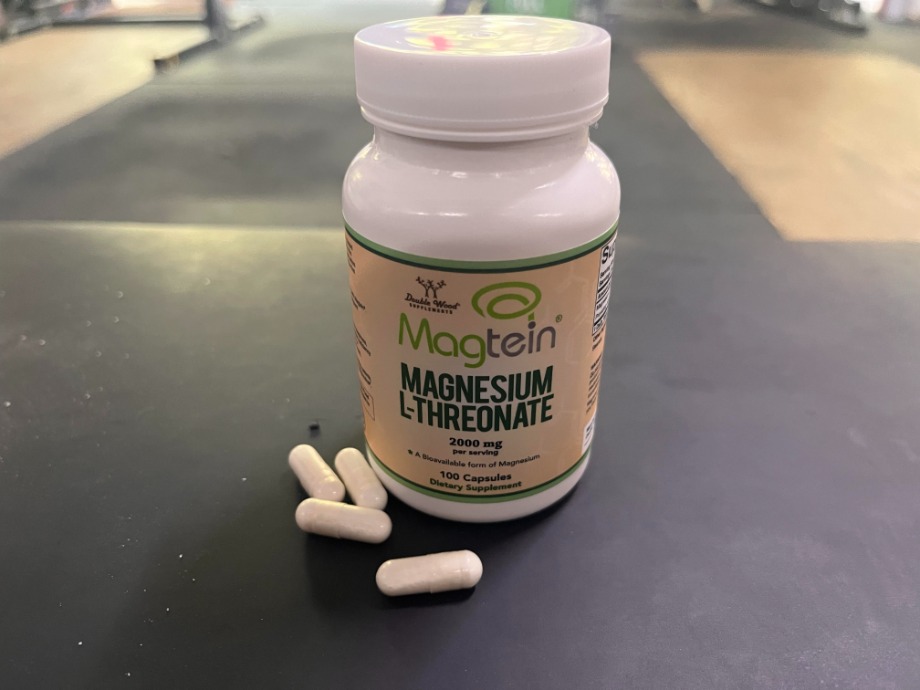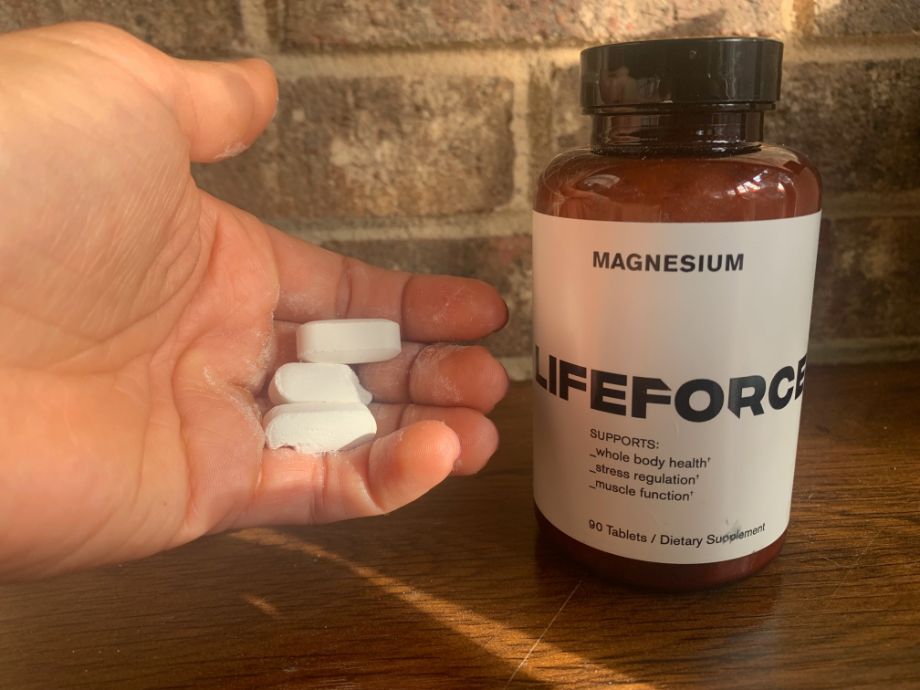You’ve probably heard about the health benefits of magnesium in the context of sleep improvement, which is how most athletes are familiar with the mineral. However, considering magnesium is involved in so many of our bodily processes, there’s much more juice to be squeezed out of this nutrient.
An analysis published in the Open Heart, a scientific journal known for exploring cardiovascular disease, showed that recent farming practices have resulted in nutrient-depleted soil and unbalanced crop fertilization. This has resulted in most of the food sources of magnesium being much lower1 than it was decades ago.
RELATED: 12 Foods High in Magnesium From A Registered Dietitian
In the same study, it is mentioned that humans in the Paleolithic period consumed 600 milligrams of magnesium each day, as opposed to now, when 60% of North Americans aren’t even consuming the recommended daily allowance (RDA). So, let’s talk about magnesium supplements, the health benefits of magnesium as well as how much you need to optimize your wellness.
Medical disclaimer: This article is intended for educational and informational purposes only. It is not intended as a substitute for medical advice. For health advice, contact a licensed healthcare provider.
Key Takeaways
- Magnesium can be helpful in supporting heart health, sleep quality, and bone health by helping the body to absorb calcium and Vitamin D
- You may already be getting the recommended amount of magnesium if you eat a balanced diet full of legumes, whole grains, and green leafy vegetables
- Some recent research is beginning to show we may need more magnesium than the RDA suggests and most Americans may not be getting adequate magnesium from food sources
What is Magnesium?
Magnesium is a micronutrient that’s responsible for supporting many vital bodily functions, including the production of ATP (adenosine triphosphate), protein synthesis, prevention of osteoporosis, and supporting the nervous system.
Unfortunately, national health and wellness surveys consistently show that most Americans2 are not getting enough of the nutrient.

As mentioned, this could be due to several factors including that magnesium-rich foods are typically not the most popular choices in America. Even those who do eat magnesium-rich foods may not be getting as much magnesium as they should be.
Unfortunately, there are even some risk factors that may be associated with low magnesium levels, including:
- Receiving dialysis due to kidney disease
- Taking diuretics to treat kidney disease or heart disease
- Having type 2 diabetes (high blood sugar causes magnesium losses in the urine)
- Health conditions that affect nutrient absorption like Crohn’s and celiac disease
- Long-term use of Proton pump inhibitors

As always, if you have one of these health conditions, always check with your healthcare provider before taking supplements or considering alternative forms of treatment.
Benefits of Magnesium
This mineral is an essential component of the human body and plays an important role in numerous bodily processes, such as regulating muscle and nerve function and regulating blood sugar levels as well as bone health. Knowing how magnesium is used by the body, let’s get into the health benefits of consuming enough magnesium.
Assists with Improving Athletic Performance
Since magnesium plays a biological role in ensuring your muscles contract efficiently as well as being involved in energy production, it’s not a surprise that active populations have shown an interest in supplementing with the hopes that it will improve their athletic performance.
Indeed, studies have shown that low magnesium levels have been linked to a decline in athletic performance and that active individuals need about 20% more magnesium3 than sedentary individuals, as the mineral may help with delayed onset muscle soreness.
One recent study exploring the effects of magnesium supplementation on performance4 and the nervous system found that subjects saw better strength, improved recovery, and lower rates of muscle catabolism while taking magnesium.
Another systematic review found consistent evidence that magnesium supplements may improve strength and power5, especially in the lower body, as well as reducing fatigue by making energy production in the muscle cells more efficient.
RELATED: The Best Creatine for Muscle Growth of 2025
Finally, a recent randomized control trial done on cyclists supplementing daily with 350 milligrams of magnesium saw better recovery and lower rates of muscle damage after racing, compared to the placebo group. Specifically, the magnesium group produced much less lactate, which is likely what contributed to the improved recovery.

However, before we get too excited, my weightlifting friends, the evidence is more spotty on active folks who already get enough magnesium to meet requirements from food. Basically, if you are already meeting your magnesium needs, it’s unclear if supplementing on top of that provides any additional benefits.
Can Improve Sleep Quality
It has become increasingly common to use magnesium supplements as a natural remedy to help manage sleep problems, like insomnia. This makes sense considering magnesium plays a major role in regulating neurotransmitters involved in sleep like GABA (gamma-aminobutyric acid), which is known for helping the brain to relax.
It’s for this reason that magnesium has also been considered for a potential anxiety treatment. In any case, one meta-analysis6 has shown that magnesium supplements caused those with insomnia to fall asleep nearly 20 minutes faster than those who didn’t take magnesium.

RELATED: Best Melatonin Supplements
Another study done on younger adults who did not have insomnia7, but had tiring lifestyles that made it difficult to stay awake and energized during the week yielded promising results. The trial showed that, after taking an average of 332.5 milligrams of magnesium per day, subjects saw a significant decrease in daytime sleepiness or instances of falling asleep.
May Improve Symptoms of Migraine Headaches
It has been reported in the journal Biological Trace Element Research8 that those who have magnesium deficiency are more likely to suffer from migraines than those who aren’t deficient.
The theory is that magnesium’s role in attenuating inflammation in the central nervous system and regulating neurotransmitters in the brain is the mechanism by which it eases the symptoms of migraine headaches. The American Migraine Foundation even offers magnesium as a potential treatment for this ailment, recommending a dose of 400-600 milligrams of magnesium per day.
The problem is, this dose is dangerously close to the upper limit of what we should be getting from supplements and can greatly increase the risk of toxicity and negative side effects. Luckily, studies show that those suffering from migraines9 who get enough magnesium from magnesium-rich foods can see the same benefits as dietary supplements.
Can Support Bone Health
Magnesium plays an important role in stimulating bone-forming cells called osteoblasts. The essential mineral also helps the bones take up Vitamin D and calcium to assist in achieving adequate bone density10. This is why not getting enough magnesium has been shown to be associated with an increased risk of osteoporosis and more fragile bones11, especially in older adults.
RELATED: Vitamin D3 Benefits: Beyond Bone Health
However, one large meta analysis12 found that while magnesium supplementation can help increase bone strength in the pelvis and femur, there isn’t enough evidence at this time to support its ability to strengthen bones in other areas of the body.
How Much Magnesium Should You Take?
The recommended daily allowance (RDA) for magnesium is 300-420 milligrams daily, but this is the amount needed to prevent magnesium deficiency. In reality, scientists suggest the body needs more than this for optimal wellness. How much magnesium this is, though, varies depending on what health benefits you’re looking to obtain.
If you need support with the symptoms of migraines, studies show supplementing with 500-600 milligrams13 of magnesium dicitrate could be ideal and that 350 milligrams may be the effective dose for athletic performance14.
Despite this, speak to your healthcare provider or a registered dietitian if you have questions about getting enough magnesium. Remember, it is possible to get too much magnesium. The UL (tolerable upper intake level) of supplemental magnesium is 350 milligrmas per day for adults, so taking any high doses should be approved as necessary by a professional first.
Magnesium oxide, magnesium citrate, and magnesium glycinate are the most common types of elemental magnesium to supplement with. However, studies show14 that magnesium citrate may be the most well tolerated and absorbed compared to other forms.
RELATED: Different Types of Magnesium: The Mineral Doing the Most
Potential Magnesium Side Effects
Generally speaking, you should check with a dietitian or physician before taking magnesium supplements if you have any medical conditions. This is especially true if you are taking prescription medications like proton pump inhibitors, medications for heart disease or kidney disease, diuretics, or bone health medications.
Magnesium should also be well tolerated when taken as directed, but in rare cases or in high doses there are some side effects to be aware of. Those that have been reported include abdominal cramps, nausea, low blood pressure, abnormal heart rhythm, and diarrhea.
Incorporating Magnesium Into Your Diet
If you’re concerned about the amount of magnesium you’re getting being too high, the good news is that a magnesium toxicity is much harder to achieve if you are getting your magnesium from food sources. As mentioned, magnesium levels in some magnesium-rich foods aren’t as high as they were decades ago, but the foods in this category should be included in a balanced diet anyway.
To optimize magnesium intake, you should focus on foods such as whole grains, legumes like black beans and cashews, green leafy vegetables such as chard and spinach, and nuts and seeds like pumpkin seeds and chia seeds. Magnesium is also found in high amounts in dark chocolate, which is also high in other antioxidants.
Benefits of Magnesium: Final Thoughts
Magnesium is an essential mineral that has been attributed to being able to help lower high blood pressure, help the body absorb calcium and Vitamin D, help manage type 2 diabetes, improve bone health, and boost sleep quality. And, unlike many hyped-up supplements these days, most of these purported health benefits actually have some solid research behind it.
RELATED: The Best Calcium Supplements of 2025
And, again like most minerals, you can get this nutrient from both food sources and supplements, but it’s safest to get it through food. That said, many of these foods may be stripped of their magnesium, which is why supplementation may be necessary in some cases.
If you’re concerned that you’re not getting enough magnesium from a balanced diet, be sure to ask your healthcare provider about a blood test to confirm your magnesium levels before you take a high-dose supplement.
Benefits of Magnesium: FAQs
Is it good to take magnesium every day?
In general, magnesium is well-tolerated when taken in the recommended daily amounts16 of 400–420 milligrams for males and 310–320 milligrams for females.
What are the symptoms of magnesium deficiency?
Common symptoms of a magnesium deficiency could be fatigue, low appetite, muscle cramps, tingling in the extremities, heart palpitations, migraine headaches, nausea, irritability, and poor sleep.
What are the top three uses for magnesium?
The three most common reasons for taking magnesium supplements include better sleep quality, improving migraine symptoms, and supporting bone health.
References
- DiNicolantonio JJ, O’Keefe JH, Wilson W. Subclinical magnesium deficiency: a principal driver of cardiovascular disease and a public health crisis [published correction appears in Open Heart. 2018 Apr 5;5(1):e000668corr1. doi: 10.1136/openhrt-2017-000668corr1.]. Open Heart. 2018;5(1):e000668. Published 2018 Jan 13. doi:10.1136/openhrt-2017-000668
- Omofuma OO, Fang D, Yell N, Falomo O, Liu J, Steck SE. Trends in Reported Calcium and Magnesium Intake from Diet and Supplements by Demographic Factors: National Health and Nutrition Examination Survey, 2003-2018. J Acad Nutr Diet. 2024;124(10):1288-1301.e5. doi:10.1016/j.jand.2024.04.017
- Tarsitano MG, Quinzi F, Folino K, et al. Effects of magnesium supplementation on muscle soreness in different type of physical activities: a systematic review. J Transl Med. 2024;22(1):629. Published 2024 Jul 5. doi:10.1186/s12967-024-05434-x
- Liguori S, Moretti A, Paoletta M, Gimigliano F, Iolascon G. Role of Magnesium in Skeletal Muscle Health and Neuromuscular Diseases: A Scoping Review. Int J Mol Sci. 2024;25(20):11220. Published 2024 Oct 18. doi:10.3390/ijms252011220
- Zhang Y, Xun P, Wang R, Mao L, He K. Can Magnesium Enhance Exercise Performance?. Nutrients. 2017;9(9):946. Published 2017 Aug 28. doi:10.3390/nu9090946
- Mah J, Pitre T. Oral magnesium supplementation for insomnia in older adults: a Systematic Review & Meta-Analysis [published correction appears in BMC Complement Med Ther. 2024 Dec 19;24(1):418. doi: 10.1186/s12906-024-04721-w.]. BMC Complement Med Ther. 2021;21(1):125. Published 2021 Apr 17. doi:10.1186/s12906-021-03297-z
- Cao Y, Zhen S, Taylor AW, Appleton S, Atlantis E, Shi Z. Magnesium Intake and Sleep Disorder Symptoms: Findings from the Jiangsu Nutrition Study of Chinese Adults at Five-Year Follow-Up. Nutrients. 2018;10(10):1354. Published 2018 Sep 21. doi:10.3390/nu10101354
- Dolati S, Rikhtegar R, Mehdizadeh A, Yousefi M. The Role of Magnesium in Pathophysiology and Migraine Treatment. Biol Trace Elem Res. 2020;196(2):375-383. doi:10.1007/s12011-019-01931-z
- Slavin M, Li H, Khatri M, Frankenfeld C. Dietary magnesium and migraine in adults: A cross-sectional analysis of the National Health and Nutrition Examination Survey 2001-2004. Headache. 2021;61(2):276-286. doi:10.1111/head.14065
- Liu L, Luo P, Wen P, Xu P. The role of magnesium in the pathogenesis of osteoporosis. Front Endocrinol (Lausanne). 2024;15:1406248. Published 2024 Jun 6. doi:10.3389/fendo.2024.1406248
- Rondanelli M, Faliva MA, Tartara A, et al. An update on magnesium and bone health. Biometals. 2021;34(4):715-736. doi:10.1007/s10534-021-00305-0
- Groenendijk I, van Delft M, Versloot P, van Loon LJC, de Groot LCPGM. Impact of magnesium on bone health in older adults: A systematic review and meta-analysis. Bone. 2022;154:116233. doi:10.1016/j.bone.2021.116233
- von Luckner A, Riederer F. Magnesium in Migraine Prophylaxis-Is There an Evidence-Based Rationale? A Systematic Review. Headache. 2018;58(2):199-209. doi:10.1111/head.13217
- Setaro L, Santos-Silva PR, Nakano EY, et al. Magnesium status and the physical performance of volleyball players: effects of magnesium supplementation. J Sports Sci. 2014;32(5):438-445. doi:10.1080/02640414.2013.828847
- Werner T, Kolisek M, Vormann J, et al. Assessment of bioavailability of Mg from Mg citrate and Mg oxide by measuring urinary excretion in Mg-saturated subjects. Magnes Res. 2019;32(3):63-71. doi:10.1684/mrh.2019.0457
- Office of dietary supplements – magnesium. NIH Office of Dietary Supplements.







